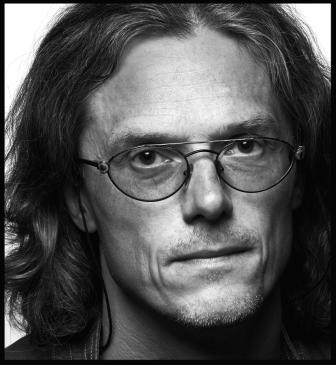Gedicht
Eugenijus Ališanka
FROM THE CASE OF BONES
for six hundred years the bones ached in the middle ages they were stretched according to the gothic canons of beauty during the renaissance soldiers whipped them on pillars with lashes of ox-leather in the era of classicism the architects put into practice the rule of the golden section for some reason called the bed of procrustes in soviet times during the first world war dogs dragged them from one line of the front to another during the second world war soap was rendered from them in postwar times each small bone was stripped there where it was even difficult to piss in the cold as well as here at cathedral square buzzing with flies in the century’s last decade one could see mechanisms crushing bones but more often arthritis and radiculitis bent them but as pseudo-eugenijus writes in the year two thousand bones will disappear and the earth will ascend into the new eon of a new boneless god
© Translation: 2010, Kerry Shawn Keys
Publisher: Poetry International, , 2010
Publisher: Poetry International, , 2010
UIT DE GESCHIEDENIS VAN BOTAANDOENINGEN
zeshonderd jaar leden botten pijn in de middeleeuwen werden ze gerekt langer gemaakt volgens de canon van gotische schoonheid in de bloeitijd van de renaissance geselden soldaten hen met ossenleren zwepen aan schandpalen de architecten van het classicistische tijdvak pasten de regels van de gulden snede toe die in de jaren van het socialisme om een of andere reden het procustesbed werd genoemd tijdens de eerste wereldoorlog sleepten honden ze van de ene kant van de frontlijn naar de andere tijdens de tweede werd er boerenzeep van gemaakt na de oorlog werd elk botje terplekke blootgelegd zowel waar het zo koud was dat zelfs pissen er moeilijk was als ook hier op het kathedraalplein zoemend van vliegen in het tiende decennium doken er nog botverpletterende mechanismen op maar meer frequent voor het krommen en draaien van botten waren artritis en radiculitis maar zoals pseudo-eugenijus schreef zullen er in het jaar tweeduizend geen botten meer zijn en zal de aarde een nieuwe eon binnentreden van een nieuwe botloze god
© Vertaling: 2010, Jo Govaerts
IŠ KAULŲ LIGOS ISTORIJOS
šešis šimtus metų skaudėjo kaulus viduramžiais tampė juos ilgino pagal gotikinio grožio kanonus renesanso žydėjimo metais kareiviai plakė jaučio odos rimbais ant gėdos stulpų klasicizmo epochos architektai taikė auksinio pjūvio taisyklę kažkodėl socializmo laikais vadintą prokrusto lova pirmojo pasaulinio karo metais tąsė šunys iš vienos fronto linijos pusės į kitą antrojo metais virė ūkinį muilą pokary išrengdavo iki nuogumo kiekvieną kauliuką tiek ten kur ir nusišlapinti šaltyje buvo nelengva tiek ir čia katedros aikštėje dūzgiant musėms dešimtame dešimtmetyje dar pasirodydavo kaulus traiškančių mechanizmų nors daugiau suko artritas ir lankstė radikulitas bet kaip rašo pseudo-eugenijus dutūkstantaisiais metais kaulai išnyksiantys ir žemė įžengsianti naujajan naujojo dievo be kaulų eonan
© 1999, Eugenijus Ališanka
From: Dievakaulis
Publisher: Lietuvos rašytojų sąjungos leidykla, Vilnius
From: Dievakaulis
Publisher: Lietuvos rašytojų sąjungos leidykla, Vilnius
Gedichten
Gedichten van Eugenijus Ališanka
Close
UIT DE GESCHIEDENIS VAN BOTAANDOENINGEN
zeshonderd jaar leden botten pijn in de middeleeuwen werden ze gerekt langer gemaakt volgens de canon van gotische schoonheid in de bloeitijd van de renaissance geselden soldaten hen met ossenleren zwepen aan schandpalen de architecten van het classicistische tijdvak pasten de regels van de gulden snede toe die in de jaren van het socialisme om een of andere reden het procustesbed werd genoemd tijdens de eerste wereldoorlog sleepten honden ze van de ene kant van de frontlijn naar de andere tijdens de tweede werd er boerenzeep van gemaakt na de oorlog werd elk botje terplekke blootgelegd zowel waar het zo koud was dat zelfs pissen er moeilijk was als ook hier op het kathedraalplein zoemend van vliegen in het tiende decennium doken er nog botverpletterende mechanismen op maar meer frequent voor het krommen en draaien van botten waren artritis en radiculitis maar zoals pseudo-eugenijus schreef zullen er in het jaar tweeduizend geen botten meer zijn en zal de aarde een nieuwe eon binnentreden van een nieuwe botloze god
© 2010, Jo Govaerts
From: Dievakaulis
From: Dievakaulis
FROM THE CASE OF BONES
for six hundred years the bones ached in the middle ages they were stretched according to the gothic canons of beauty during the renaissance soldiers whipped them on pillars with lashes of ox-leather in the era of classicism the architects put into practice the rule of the golden section for some reason called the bed of procrustes in soviet times during the first world war dogs dragged them from one line of the front to another during the second world war soap was rendered from them in postwar times each small bone was stripped there where it was even difficult to piss in the cold as well as here at cathedral square buzzing with flies in the century’s last decade one could see mechanisms crushing bones but more often arthritis and radiculitis bent them but as pseudo-eugenijus writes in the year two thousand bones will disappear and the earth will ascend into the new eon of a new boneless god
© 2010, Kerry Shawn Keys
Publisher: 2010, Poetry International,
Publisher: 2010, Poetry International,
Sponsors

























